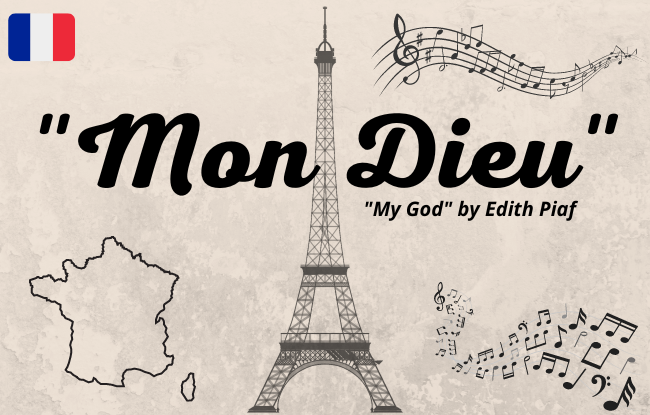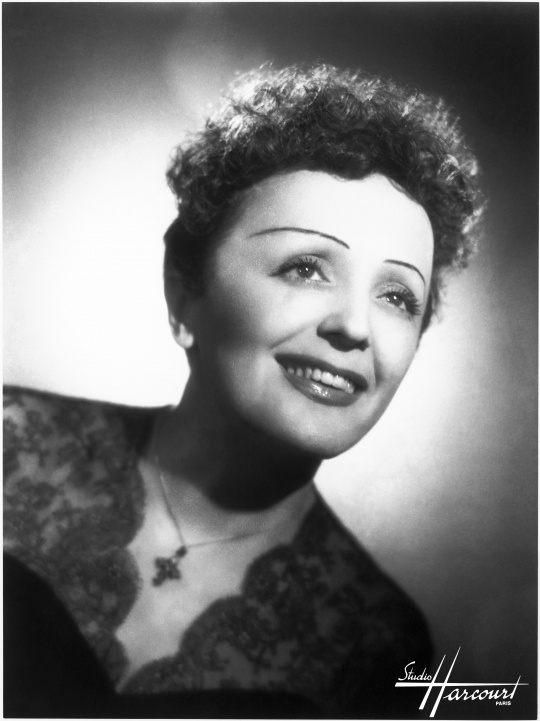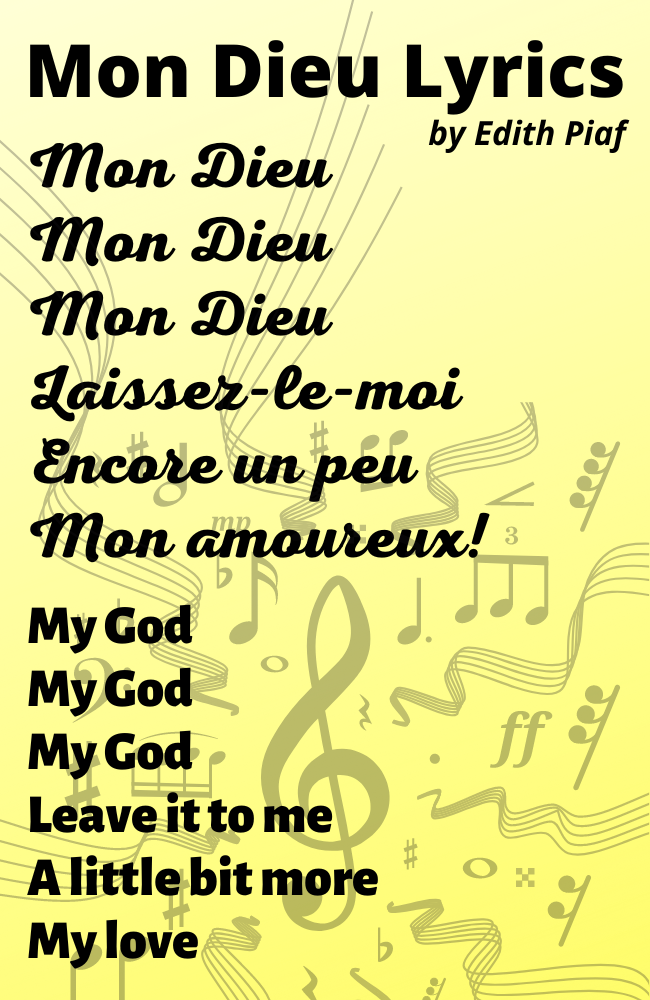Mon Dieu Song Background
“Mon Dieu” (meaning: “my God”; pronunciation: mɔ̃ djø) is a French song made famous by Edith Piaf (1915-1963). Released in 1960 and written by Michel Vaucaire (music) and Charles Dumont (lyrics), Piaf initially rejected the song.

With over 10 million views on YouTube and recordings by other famous French singers including Mireille Mathieu, “Mon Dieu” is one of Edith Piaf’s most famous songs of all time. Piaf also recorded the song with English lyrics (see YouTube video at end of post).

Mon Dieu lyrics analysis
Unlike many other Edith Piaf songs, the lyrics to Mon Dieu are not very complicated in terms of grammar and vocabulary. That said, we will still highlight several key points below.
Song synopsis
Like many of Piaf’s other songs, Mon Dieu is about the intensity and passion of love. In the song she sings about “giving me” (or leaving me; laissez-le moi) different amounts of time (one month, two months, etc.) to create memories (s’fabriquer des souvenirs) and light up her life (le temps d’illuminer).
Line-by-line commentary
Mon Dieu, Mon Dieu, Mon Dieu
The first three lines of the song, “Mon Dieu, Mon Dieu, Mon Dieu”, translate to “my God” said three times. This post on Frenchtoday.com covers 13 French expressions related to God.
Laissez-le-moi
The line “Laissez-le moi” translates to “leave it to me”. “Laisser“ means to let or leave. The “le” in this line means “it” and is direct object pronoun, which we cover in depth in our object pronouns page. The word “moi” means me in French, as opposed to “je” (personal pronoun), which means “I”.
Encore un peu
The line “Encore un peu” translates to “a little more” or “a bit more”. “Encore“ has multiple meanings including “still” and again”.
Mon amoureux!
We translated the line “Mon amoureux” translates to “My love”. The dictionary definition of “amoureux“ in this context is “boyfriend” or “sweetheart”. “Amoureux” is also an adjective for “in love”.
Un jour, Deux jours, Huit jours
The translation of “Un jour, Deux jours, Huit jours” is “one day, two days, eight days”. This page covers French numbers 1-100 in depth.
À moi
The French expression, “À moi“ is short for “à mon tour”, which means “it’s my turn”. Interestingly, this is the name of my friend, Camille’s (from Frenchtoday.com) well-known audio French course, “À Moi Paris“!
Le temps de s’adorer
The line, “Le temps de s’adorer” translates to “the time to love each other”. This is an example of a reciprocal reflexive verb. This page on our site covers reflexive (also called pronominal) verbs in detail.
De se le dire
This line translates to “to say to each other”. Again, this is a reciprocal reflexive verb, meaning “to each other”. The “le” is a direct object pronoun meaning “it”.
Le temps de s’fabriquer, Des souvenirs
The line, “Le temps de s’fabriquer, Des souvenirs” translates to “the time to make memories”. The “s’fabriquer” is a shortening of “se fabriquer”, whish is another reciprocal verb and really means “to make for each other”. The word “souvenir“ is a noun for memory and the verb “se souvenir” means to remember.
Remplir un peu, Ma vie
The lines “Remplir un peu, Ma vie” translate to “to fill my life a bit (or a little)”. Edith Piaf is famous for singing about the deep emotions, both happy and sad, of life.
Le temps de commencer, Ou de finir
The lines “Le temps de commencer, Ou de finir” translate to “the time to start, or to finish”. These are example of basic regular -er and -ir verbs, which are covered on this page of our site.
Le temps d’illuminer, Ou de souffrir
These lines translate to “The time to light up, Or to suffer”. Again, Piaf is the great master of highlighting the ups and downs of emotions in life in her songs’ lyrics.
Même si j’ai tort
The line, “Même si j’ai tort” translates to “even if I’m wrong”. The word “même“ has multiple translations including both “even” and “same”. This line is an example of an “avoir” (to have) expression. This page on our site covers the complete conjugation tables of avoir along with common usages.

Mon Dieu Lyrics: French With English Translation
Mon Dieu
Mon Dieu
Mon Dieu
Laissez-le-moi
Encore un peu
Mon amoureux!
Un jour
Deux jours
Huit jours
Laissez-le-moi
Encore un peu
À moi
My God
My God
My God
Leave it to me
A little bit more
My love
One day
two Days
Eight days
Leave it to me
A little bit more
To me
Le temps de s’adorer
De se le dire
Le temps de s’fabriquer
Des souvenirs
Mon Dieu
Oh oui mon Dieu!
Laissez-le-moi
Remplir un peu
Ma vie
The time to love each other
To say to each other
The time to make
Memories
My God
Oh yes my God
Leave it to me
Fill my life a little
Mon Dieu
Mon Dieu
Mon Dieu!
Laissez-le-moi
Encore un peu
Mon amoureux
Six mois
Trois mois
Deux mois
Laissez-le-moi
Pour seulement
Un mois
My God
My God
My God
Leave it to me
My love
Six months
Three months
Two months
Leave it to me
For only one month
Le temps de commencer
Ou de finir
Le temps d’illuminer
Ou de souffrir
Mon Dieu
Mon Dieu
Mon Dieu
Même si j’ai tort
Laissez-le-moi
Un peu
Même si j’ai tort
Laissez-le-moi
The time to start
Or to finish
The time to light up
Or to suffer
My God
My God
My God
Even if I’m wrong
Leave it to me
A little
Even if I’m wrong
Leave it to me
Encore
again
Listen to “Mon Dieu” by Édith Piaf
The following video of the song Mon Dieu has over 10 million views on YouTube.
You can also listen to Mon Dieu on Spotify:
Piaf also released a version of Mon Dieu with English lyrics:
Become an expert in French song lyrics!
We offer endless lessons covering the lyrics to famous French songs. For Edith Piaf (complete list of top songs on this page), we cover the following songs: La Vie En Rose, Non, Je Ne Regrette Rien and Sous Le Ciel De Paris. We provide analysis of lyrics for many other top French songs including: Je T’aime, Moi Non Plus (Serge Gainsbourg), Dominique (Singing Nun), Le Port D’Amsterdam and Ne Me Quitte Pas (Jacques Brel), La Bohème (Charles Aznavour), Les Feuilles Mortes and C’est Si Bon (Yves Montand), La Mer (Charles Trenet) and Les Champs Elysées (Joe Dassin),
